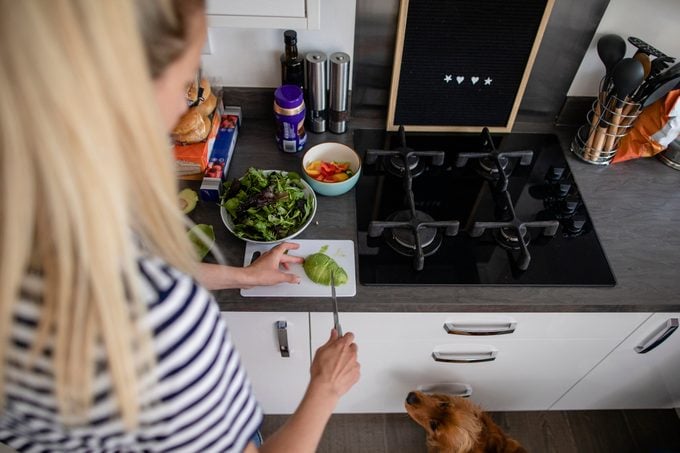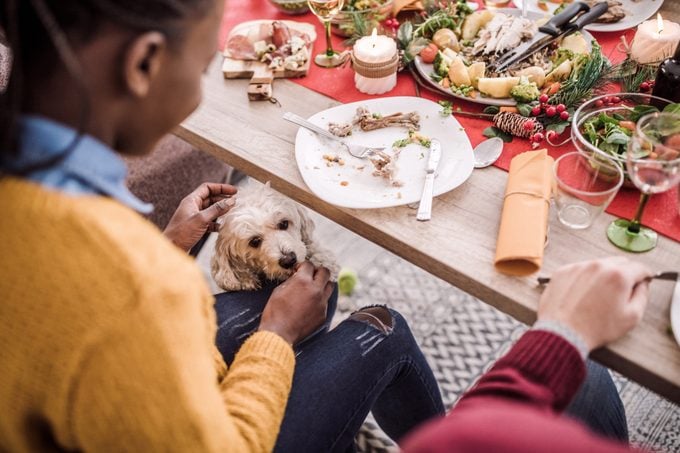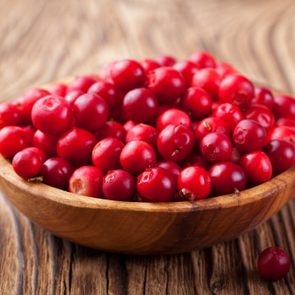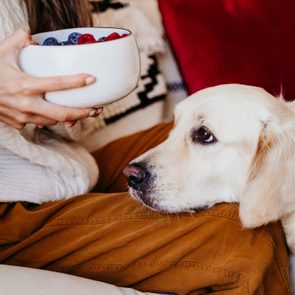Can Dogs Eat Avocado?
Updated: Nov. 08, 2021
Avocados are all the craze these days. But can dogs eat avocado?
Sharing avocado with Fido
Avocado toast, avocado eggs, and even avocado smoothies are all the rage. That’s because avocados are rich in heart-healthy unsaturated fats, fiber, folate, B vitamins, and vitamins K, C, and E, among other nutrients.
Most dogs are drawn to human foods, at least in general. But while many fruits and vegetables we eat are also safe for a dog to eat, in simple terms, it’s probably best not to let a dog eat avocado.
Here’s what the experts need you to know about dogs and avocado.
Can dogs eat avocado?
According to experts and reputable animal organizations, there is not a clear or straightforward answer to the question of whether dogs can eat avocado. While avocados do offer excellent nutrition, they can also harm a dog in several ways.

Are avocados toxic to dogs?
Avocados contain a fungicidal toxin called persin. It can cause serious symptoms in some animals that may result in death, according to the American Kennel Club (AKC). All parts of an avocado contain varying levels of persin, though most of the toxin is typically in an avocado’s skin, leaves, and pit.
Even though dogs are more resistant to the harmful impacts of persin than some other species, the AKC says that’s no reason to think avocados are safe for dogs to consume. And researchers do not know exactly what dose of persin can cause toxicity or death in pets.
Other reasons not to feed dogs avocado
Aside from containing persin, experts note avocados can also cause digestive problems and weight gain, and some parts can pose a choking hazard.
Avocado can be problematic for some dogs as it is high in fat, which can cause vomiting and diarrhea, says Tina Wismer, DVM, the senior director of toxicology for the ASPCA Animal Poison Control Center. Eating too much fat can also cause a dog to gain weight or even become obese.
“The pit, if ingested, can cause an obstruction, and may need surgical removal,” Wismer adds.
Is there any reason to feed dogs avocado?
In small quantities, experts say the fruit of a ripe avocado is most likely safe for a dog to eat.
There is no need to feed avocado to a dog, but if you do decide to share, experts stress that you should ensure the dog only gets a small amount of the ripe fruit, and cannot access an avocado’s skin or pit.
This may require monitoring while a dog eats avocado flesh, and keeping avocado skin and pits somewhere safe like a dog-proof garbage or composting can.
(Here’s why it feels good to look into your dog’s eyes.)
Why are some foods dangerous for dogs?
Some foods that humans eat safely can be dangerous to dogs for several reasons. They may be difficult or impossible to digest, for example, or have parts that can cause choking or become stuck in or damage a dog’s digestive tract.
“Each species of animal has differences in absorption, metabolism, and excretion of compounds,” Wismer says, “which impacts what they are able to digest properly.”
Some foods are also unsafe for dogs because they contain toxins, compounds that can damage or destroy healthy cells.
Jerry Klein, DVM, the chief veterinary officer of the AKC, says that in some cases, the seeds or stones of certain fruits, such as cherries, plums, peaches, nectarines, mangoes, and apples, may contain toxins like cyanide compounds.
Experts add that in some cases, certain larger dogs may be able to digest more of, or safely swallow, some foods or parts of foods smaller dogs cannot. They also say some dogs have naturally smaller or a more narrow esophagus, which means they may have trouble swallowing the same food portions other dogs can safely eat.
What are signs of persin toxicity?
Different dogs may experience slightly different symptoms when exposed to persin. But in general, the AKC says, dogs who consume large quantities of persin can develop:
- vomiting
- diarrhea
- pain or tightness in the chest
- extreme lethargy
- shortness of breath or trouble breathing
- swelling
What to do if a dog eats avocados
If a dog eats a large amount of avocado flesh or any avocado leaves, skin, or pit, experts say it’s probably safest to contact your veterinarian, an emergency veterinary clinic, or an animal poison control hotline like the American Society for the Prevention of Cruelty to Animals’ Animal Poison Control Center at 1-888-426-4435.
If a dog only has consumed a small amount of ripe avocado flesh, experts say it’s best to monitor the dog closely for several hours and seek medical care if symptoms develop.
Other foods dogs cannot eat
Organizations such as the Humane Society of the United States provide lists of human foods that are not safe for dogs to consume. Some of the most common foods that can be dangerous for dogs to eat, or that can contribute to health complications, include:
- grapes, raisins, and currants
- onion, leek, and chives
- garlic and most other fresh and dried seasonings or spices
- caffeine
- chocolate
- ice cream and milk
- fruit and vegetable pits, husks, shells, stems, leaves, skins, cores, stones, pith, or peels
- apple and mustard seeds
- candy
- artificial sweeteners
- gum
- yeast dough
- alcohol and hops
- tomatoes
- mushrooms
- very sweet or salty foods
- cherries
- asparagus
- raw potatoes
- raw eggs, meat, poultry, fish, seafood, or animal bones
- coconut flesh, oil, and water
- jams and jellies
Foods dogs can eat
Avocados may not be the safest treat to feed your dog. But a majority of foods are safe for dogs in moderation and with proper preparation.
Safe food treats for dogs include:
- strawberries, raspberries, blueberries, cranberries, and blackberries
- bananas
- apples
- melons and cantaloupe
- pineapple
- cucumber
- mango
- peaches, pears, plums, and nectarines
- broccoli and cauliflower
- Brussels sprouts
- celery and cucumber
- carrots
- green beans and peas
- leafy greens
- grains, cereals, and pulses
- bread
- mild cheeses
- corn and popcorn
- peanut butter
- honey
- yogurt

Tips for feeding dogs human foods
“As for any other foods added to a pet’s diet, the contribution should be kept below 10 percent of the calories,” says Jennifer A. Larsen, DVM, MS, PhD, a professor of clinical nutrition at the University of California-Davis Veterinary Medicine Teaching Hospital.
Avocados are particularly high in fat, Dr. Larsen adds, so the amount you feed a dog should be minimized. Dr. Larsen says you can check out the UC-Davis Veterinary Medicine Teaching Hospital’s website for more elaborate guidelines on feeding dogs treats and ideas for fun and exciting treats to feed your dog.
How to prepare fruits and vegetables for dogs
The experts say all fruits and vegetables should be well-washed and have their skins or peels, pits, cores, stones, pith, spikes, and other inedible parts removed before feeding them to a dog. Apples must also have their seeds removed to be safe for dogs to eat.
Most fruits and veggies are OK to serve to a dog raw, though some foods like pumpkin and potatoes must be cooked before a dog eats them. As a rule, if you need to cook something before eating it yourself, it probably also needs to be properly cooked before it is safe for a dog to consume.
“It’s best to cut vegetables and hard fruits into small, bite-size pieces to avoid any choking hazards,” Wismer adds. Klein says the size you cut up foods before feeding them to dogs should be relative to the dog’s size, meaning smaller dogs need to eat smaller pieces and vice versa.
Next, check out why owning a dog is healthy.





















